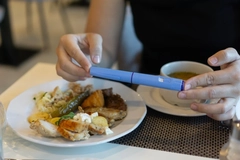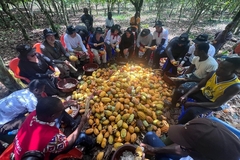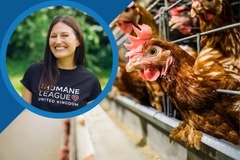
- Industry news
Industry news
- Category news
Category news
- Reports
- Key trends
- Multimedia
- Journal
- Events
- Suppliers
- Home
- Industry news
Industry news
- Category news
Category news
- Reports
- Key trends
- Multimedia
- Events
- Suppliers
Beans to bonuses: Puratos pays out €7M in cocoa farmer payments for sustainability push
As concerns over farmer livelihoods and ethical sourcing intensify, cocoa sustainability has become a growing priority across the global chocolate industry. In response, Puratos’ Cacao-Trace report reveals a record €7 million (US$8 million) in direct payments to cocoa-growing communities in 2024 — its highest disbursement to date.
Puratos and its Belgian chocolate brand Belcolade brand paid €3.2 million (US$3.7 million) in a “Chocolate Bonus” and €3.8 million (US$4.4 million) in Quality Premiums to farmers for high-quality beans, up over 33% from the previous year.
Nearly 24,073 farmers across eight countries including Côte d’Ivoire, Vietnam, Mexico, and Papua New Guinea benefited from the program, states the report.
The focus of the program is “great taste” and “doing good,” reflecting Puratos’s ambition to have a positive and long-lasting impact for future generations worldwide, Youri Dumont, chocolate business unit lead for Puratos, tells Food Ingredients First.
“It [Cacao-Trace program] has channeled much-needed funding into supporting education, for example: constructing and renovating schools to help build brighter futures in the eight countries where the program operates.”
“In 2024 alone, Cacao-Trace supported seven international school projects and distributed 11,130 school kits designed to help students learn, grow and thrive.”
Additionally, Puratos advanced its cocoa innovation with a new grinding line in Mexico, a roasting line in Vietnam, and a post-harvest fermentation center in Peru.
 The Cacao-Trace program has funded school construction and renovations in the eight countries where it operates.
The Cacao-Trace program has funded school construction and renovations in the eight countries where it operates.
Tapping financial bonuses
Puratos calculates the Chocolate Bonus by the amount of Cacao-Trace chocolate sold each year, directly boosting farmer income and funding health and education projects in cocoa-growing communities.
Dumont says the funding facilitated 72 global water equipment building projects in 2024, as well as the construction of crucial maternity facilities.
The Quality Premium is paid on top of the farmgate price to all Cacao-Trace farmers to reflect the superior quality of the wet cocoa beans they deliver.
“The close connection between our dedicated teams and the local communities they serve is the true power behind Cacao-Trace,” says Dumont.
“Direct partnerships like these ensure financial bonuses translate into valuable community projects and also keep recipients at the heart of decision-making, allowing them to direct funds to the most urgent or important projects.”
Supporting farmer living incomes
While the recent surge in cocoa prices due to intense heat and rainfall in West Africa could be expected to improve farmer incomes, Puratos’ report states that farmers earn only 6% of the chocolate bar’s final value.
Research done on cocoa producers’ households has revealed that in Côte d'Ivoire and Ghana, 30-58% of households earn a gross income below the World Bank's extreme poverty line, and 73-90% do not earn a living income.
 The Living Income Reference Price determines the farmgate price per metric ton of cocoa needed for a farmer family to earn a living income in each country Puratos operates, says Dumont.Additionally, Fairtrade’s 2024 West Africa Cocoa Programme Monitoring Report indicates that high production costs, low productivity, and limited access to financial services contribute to farmer income insufficiency. It also notes that farmers' perceptions of their economic situation remain low, with average satisfaction ratings between 3.7 and 4.13 out of 10.
The Living Income Reference Price determines the farmgate price per metric ton of cocoa needed for a farmer family to earn a living income in each country Puratos operates, says Dumont.Additionally, Fairtrade’s 2024 West Africa Cocoa Programme Monitoring Report indicates that high production costs, low productivity, and limited access to financial services contribute to farmer income insufficiency. It also notes that farmers' perceptions of their economic situation remain low, with average satisfaction ratings between 3.7 and 4.13 out of 10.
As a Belgian firm and signatory of Beyond Chocolate, Puratos aims to ensure that, by 2030, “all Belgian chocolate should come from sources where farmers have a living income,” says Dumont.
Beyond Chocolate is Belgium’s national, multi-stakeholder initiative launched in 2018 to make the country’s chocolate industry more sustainable, fair, and future-proof.
“To achieve this, we first measure and establish a Living Income Reference Price (LIRP) for each country using methodologies widely recognized by the chocolate sector. The LIRP assesses the farmgate price per metric ton of cocoa required for an average farmer family to earn a living income in each country where we operate,” he explains.
In 2024, Puratos reached a LIRP in most Cacao-Trace countries. “This is partly due to the globally high prices, but also thanks to the Quality Premium and Chocolate Bonus — additional and unique benefits on top of the farmgate price.”
Industry challenges
Despite the industry’s efforts at increasing cocoa supply chain sustainability, persistent farmer poverty, child labor, and deforestation continue to dampen its efforts, states the report.
Market volatility due to high price fluctuations in global cocoa markets also poses risks to farmer income stability and planning. The Cacao-Trace program tries to mitigate this with fixed minimum prices, but external pressures remain strong.
 The Cacao-Trace approach incorporates a wet bean strategy, unique fermentation techniques, and meticulous drying and roasting processes.Incomplete digital mapping and farmer data collection in several countries like Mexico and Congo are also concerns. However, the report acknowledges that improvements are being made to close traceability gaps and meet new regulatory demands, such as through the European Deforestation Regulation.
The Cacao-Trace approach incorporates a wet bean strategy, unique fermentation techniques, and meticulous drying and roasting processes.Incomplete digital mapping and farmer data collection in several countries like Mexico and Congo are also concerns. However, the report acknowledges that improvements are being made to close traceability gaps and meet new regulatory demands, such as through the European Deforestation Regulation.
“As the Cacao-Trace program continues to accelerate and expand, we’ve had to take initiative and develop relationships with large numbers of farmers, customers, and partners while running lots of active projects at the same time,” says Dumont.
“In addition, continuously reviewing and improving our processes to maintain quality as we scale up adds an extra dimension to the challenge.”
Scaling cocoa sustainability
Puratos aims to increase the Chocolate Bonus to €8 million (US$9.3 million) in 2030.
Dumont believes that scaling the program and broadening its benefits depends on its customers and consumers choosing “sustainable cocoa and Cacao-Trace products in an evolving market.”
In addition to infrastructure, Cacao-Trace will expand into “climate resilience” through agroforestry and reforestation, as part of its Science Based Targets-aligned carbon reduction strategy.
“We are also digitizing Quality Premium payments, which involves building digital and financial literacy within cocoa farming communities to ensure long-term empowerment and transparency.”
“These initiatives reflect our holistic approach to sustainability, one that supports not only better cocoa and better chocolate, but also better lives for the people behind them,” concludes Dumont.



















